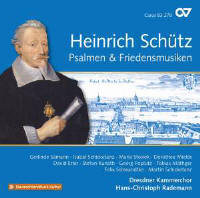Texte paru dans: / Appeared in: Carus |
|
|
Reviewer: J.
F. Weber Coming soon after the miscellaneous secular works reviewed herewith, this gives us the miscellaneous sacred works of Heinrich Schütz. Taking the unfamiliar works first, SWV 502 is Betrübte Herzen, titled Trostlied, a touching song of comfort, the only selection claimed to be a first recording. Indeed, it was written in 1647 on the death of the four-month-old son of a town councilor, and I was not even aware that it had been added to the SWV catalog. In addition, I have not found previous recordings of SWV 501 and SWV 467. The former is Mit dem Amphion zwar, funeral music for the composer’s wife, who died in 1625, at 16 minutes a moving solo performance by George Poplutz with continuo. The latter, Wo Gott, der Herr, based on Psalm 24, uses two sopranos and choir.
The other three pieces recorded once before are on the second disc. SWV 448 is Gelobet seist du, the song of the three young men in the fiery furnace (Book of Daniel), recorded by Roland Wilson (37:1). Another inexplicably neglected work, this uses a choir of five solo voices. SWV 368, Fürstliche Gnade zu Wasser und Lande, is titled Danklied. Recorded only in the early miscellaneous collection of Dietrich Knothe (6:2), this was commissioned by the duke of Weimar for the birthday of the duchess, and the composer directed the performance at Weimar in 1647. Bittinger describes the forces as voice with two instruments, but this performance divides the solo among four voices. SWV 338 is Teutonium dudum belli, recorded only in Manfred Cordes’s miscellany (21:6), coupled with its companion SWV 49 below.
Four works have each been recorded twice. Vater Abraham, SWV 477, the rich man’s appeal after seeing Lazarus in the bosom of Abraham, is such a powerful setting that it is hard to understand its neglect, yet it has been recorded only by Jacques Grimbert (4:3) and Roland Wilson (21:1). It is scored for five soloists and choir, but the bass (with strings) and the tenor (with winds) carry the main dialogue. SWV 449, Herr, unser Herrscher, is a setting of Psalm 8 for five soloists and a choir dating before 1625. SWV 461, Herr, der du bist vormals, sets Psalm 85 for a similar aggregation. SWV 465, Da pacem, Domine, leading off the second disc, performed in Mühlhausen in 1627, is an interesting acclamation of the seven imperial electors (the duke of Saxony is one of them, of course), one choir singing the antiphon, the other singing the acclamations. The last three pieces are all in the Cordes miscellany.
In sum, two
of these 19 pieces are on the Knothe disc, nine are on Hennig’s, and five
are on Cordes’s. In addition to Rademann’s uniformly fine performances, the
three discs on these last two issues of the Carus series can be recommended
because they are a remarkably complete traversal of Schütz’s miscellaneous
compositions. (Remember, there are 20 other pieces of this type scattered as
fillers among six other issues in the series, in addition to the seven
well-known major works.) The Schütz-Edition of 28 CDs in 20 volumes
lacks another dozen discs to complement the single disc of Becker Psalms,
but that is not in the cards. There are competing versions of most of the
published books, some comparing favorably with Rademann, but in the end
Rademann overwhelms the rest by the completeness of his survey. This last
entry is especially dominant over the small and scattered number of
alternatives. Vol. 20 is recommended unreservedly to every Sagittarian. | |
|
|
|
|
|
|
|
Cliquez l'un ou l'autre
bouton pour découvrir bien d'autres critiques de CD |
|




